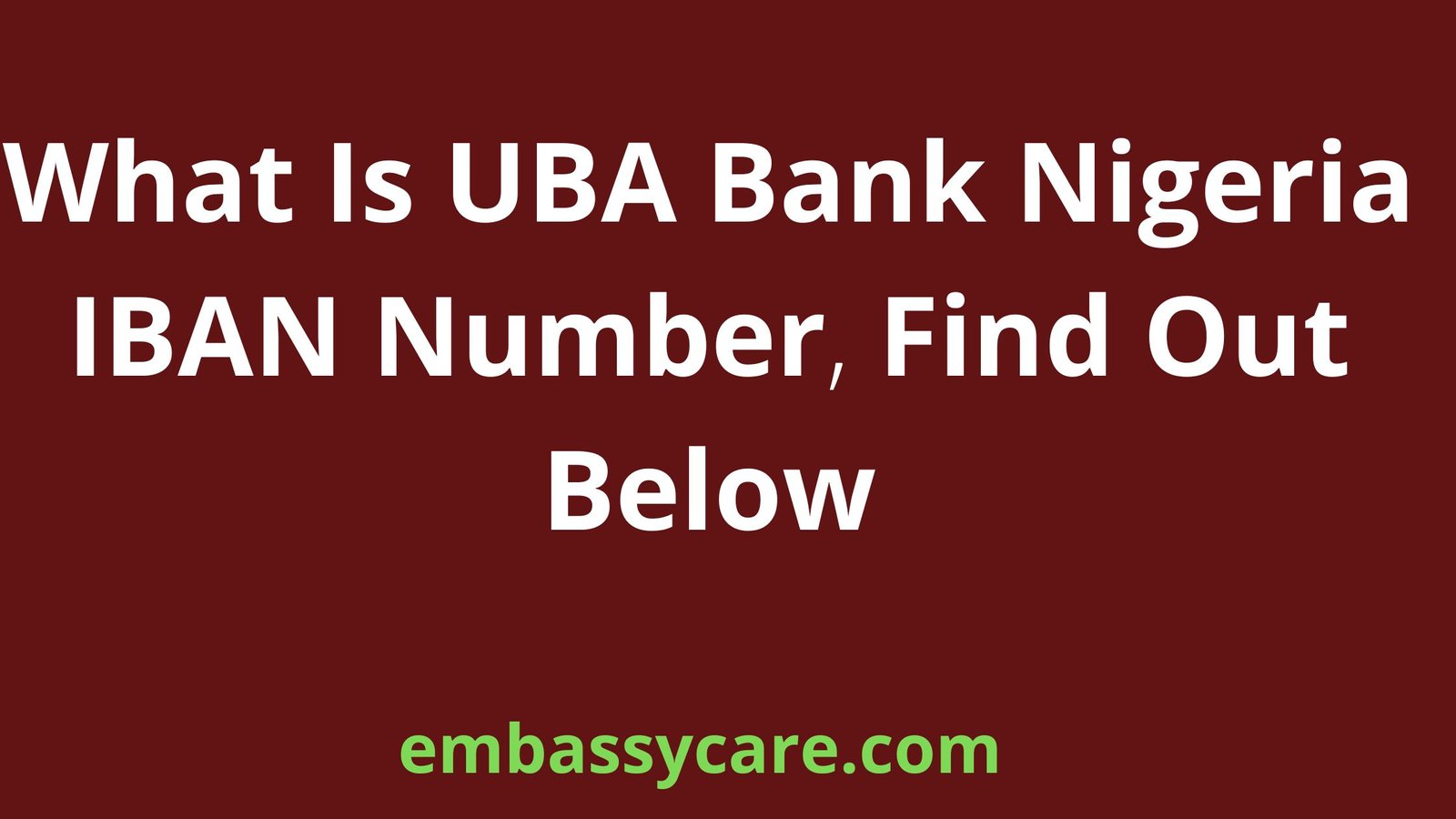Ever wondered what an IBAN for Nigeria is and why it matters? If you're dealing with international transactions or planning to send money to Nigeria, understanding IBAN is crucial. Whether you're a business owner, traveler, or simply someone looking to manage finances across borders, IBAN plays a significant role in ensuring smooth transactions. So, let's dive into the world of Nigerian IBAN and uncover everything you need to know.
Nowadays, sending money internationally has become easier than ever. However, one thing remains constant: accuracy. And when it comes to accuracy, IBAN is your best friend. Especially in Nigeria, where financial systems are rapidly evolving, knowing how IBAN works can save you from potential headaches.
In this article, we’ll break down the concept of IBAN for Nigeria, its structure, importance, and how it impacts your financial dealings. By the end, you'll have a solid understanding of why IBAN matters and how to use it effectively. So, buckle up and let's get started!
Read also:Macho Man Stephanie The Ultimate Guide To Her Life Legacy And Influence
Table of Contents
- What is IBAN?
- Nigerian IBAN Structure
- Why IBAN Matters for Nigeria
- How to Get an IBAN in Nigeria
- Using IBAN for Transactions
- Common Issues with Nigerian IBAN
- Security Tips for IBAN Usage
- The Future of IBAN in Nigeria
- IBAN vs. Other Systems
- Conclusion
What is IBAN?
Let’s start with the basics. IBAN stands for International Bank Account Number. It's a standardized system used worldwide to identify bank accounts, making international transactions more accurate and efficient. Think of it as your account's passport – it helps banks verify your account details quickly and securely.
In simpler terms, when you send money internationally, banks need to know exactly where the money is going. That’s where IBAN comes in. It provides a unique identifier for each account, ensuring the funds reach the right destination without any hiccups.
How IBAN Revolutionized Banking
Before IBAN, international transactions were a nightmare. Mistakes in account numbers or bank codes could lead to delays or even lost funds. But with IBAN, those problems became a thing of the past. It’s like GPS for your money – it knows exactly where to go and how to get there.
And guess what? Nigeria is no exception. The country has fully embraced IBAN, making it easier for Nigerians to participate in the global economy. So, whether you're sending money to Lagos or receiving payments from London, IBAN has got you covered.
Nigerian IBAN Structure
Now that we know what IBAN is, let’s talk about its structure in Nigeria. The Nigerian IBAN follows a specific format, and understanding it is key to using it correctly. Here’s a breakdown:
- Country Code: Every IBAN starts with a two-letter country code. For Nigeria, it’s "NG".
- Check Digits: The next two digits are check digits, which help verify the validity of the IBAN.
- Bank Code: This is a three-letter code that identifies the bank. For example, "001" might represent First Bank Nigeria.
- Account Number: Finally, the rest of the IBAN consists of the actual account number, which can vary in length depending on the bank.
So, an example of a Nigerian IBAN might look something like this: NG56001123456789012345678. Easy peasy, right?
Read also:Amy Neises The Rising Star In The World Of Entertainment
Why Structure Matters
The structure of an IBAN is crucial because it ensures consistency and accuracy. When banks process transactions, they rely on this structure to confirm the details are correct. Even a small mistake, like a missing digit, can cause the transaction to fail. So, always double-check your IBAN before initiating any transfer.
Why IBAN Matters for Nigeria
Now, you might be wondering, "Why does Nigeria need IBAN?" Well, the answer is simple: globalization. As Nigeria continues to integrate into the global economy, having a standardized system like IBAN becomes essential. It allows Nigerians to conduct business with the rest of the world seamlessly.
Here are a few reasons why IBAN is important for Nigeria:
- Accuracy: IBAN reduces the chances of errors in international transactions.
- Speed: With IBAN, transactions are processed faster, saving you time and hassle.
- Security: The system provides an extra layer of security, ensuring your funds are safe.
- Global Recognition: IBAN is accepted worldwide, making it easier to do business with international partners.
For a country like Nigeria, where remittances play a significant role in the economy, IBAN is a game-changer. It ensures that money sent from abroad reaches its intended recipients quickly and securely.
How to Get an IBAN in Nigeria
Getting an IBAN in Nigeria is relatively straightforward. Most banks in the country offer this service, and the process is usually simple. Here’s how you can get your own IBAN:
Step-by-Step Guide
- Visit Your Bank: Head to your local branch and ask for assistance. They’ll guide you through the process.
- Provide Details: You’ll need to provide your account number and some personal information.
- Receive Your IBAN: Once the bank processes your request, you’ll receive your IBAN. It might take a few days, depending on the bank.
Alternatively, some banks allow you to request an IBAN online through their mobile apps or websites. So, if you prefer doing things digitally, check with your bank to see if they offer this option.
Tips for a Smooth Process
Here are a few tips to make the process smoother:
- Make sure all your account details are up to date.
- Bring all necessary documents, such as your ID and account statements.
- Ask questions if you’re unsure about anything. The bank staff is there to help!
Using IBAN for Transactions
Once you have your IBAN, it’s time to put it to use. Whether you’re sending or receiving money, IBAN makes the process a breeze. Here’s how:
Sending Money with IBAN
When sending money internationally, you’ll need the recipient’s IBAN. Here’s what to do:
- Log in to your online banking platform or visit your bank.
- Initiate a new international transfer.
- Enter the recipient’s IBAN, along with other required details like the SWIFT/BIC code.
- Review the transaction and confirm.
And just like that, your money is on its way!
Receiving Money with IBAN
Receiving money is even easier. All you need to do is provide your IBAN to the sender. They’ll use it to initiate the transfer, and the funds will land in your account in no time.
Common Issues with Nigerian IBAN
While IBAN is a fantastic system, it’s not without its challenges. Here are some common issues Nigerians might face and how to resolve them:
Mistyped IBAN
One of the most common issues is entering the wrong IBAN. A single typo can cause the transaction to fail. To avoid this, always double-check the IBAN before submitting it.
Outdated Systems
Some banks in Nigeria might still be using outdated systems that don’t fully support IBAN. If you encounter this, contact your bank and ask for assistance. They might need to update their systems or provide alternative solutions.
Security Tips for IBAN Usage
Security is paramount when dealing with financial information. Here are some tips to keep your IBAN safe:
- Don’t Share It Casually: Only share your IBAN with trusted individuals or institutions.
- Monitor Transactions: Keep an eye on your account for any suspicious activity.
- Use Secure Platforms: Always use secure banking platforms when entering your IBAN.
By following these tips, you can ensure your financial information remains secure.
The Future of IBAN in Nigeria
As technology continues to evolve, so does the role of IBAN in Nigeria. With the rise of digital banking and fintech companies, IBAN is becoming even more relevant. In the future, we might see more advanced features and integrations that make transactions faster and more efficient.
Moreover, as Nigeria continues to grow economically, the demand for IBAN will only increase. It’s a system that aligns perfectly with the country’s aspirations for a more connected and prosperous future.
IBAN vs. Other Systems
While IBAN is widely used, it’s not the only system out there. Let’s compare it to some other methods:
SWIFT vs. IBAN
SWIFT and IBAN often go hand in hand, but they serve different purposes. SWIFT identifies the bank, while IBAN identifies the account. Together, they create a powerful duo for international transactions.
Local vs. Global Systems
Local systems, like Nigeria’s NUBAN (Nigerian Uniform Bank Account Number), are great for domestic transactions. However, when it comes to international dealings, IBAN takes the lead. It’s a global standard that ensures consistency and reliability.
Conclusion
And there you have it – everything you need to know about IBAN for Nigeria. From its structure to its importance and usage, IBAN is a vital tool for anyone dealing with international transactions. By understanding how it works and following the tips provided, you can ensure smooth and secure financial dealings.
So, whether you’re sending money to loved ones in Nigeria or receiving payments from abroad, IBAN has got your back. Don’t forget to share this article with your friends and family – knowledge is power!
Until next time, stay safe and keep those funds flowing!


